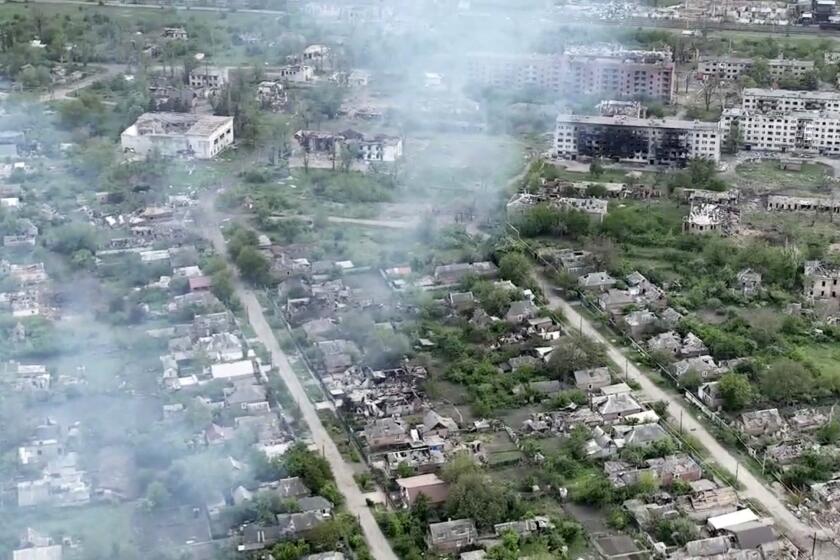Kazakh Media Live on the Edge When They Criticize Government
Irina Petrushova was upset when she received an anonymous funeral wreath on Women’s Day. She was more anxious when a decapitated dog was found hanging on the window of her office. And she became further disturbed when someone left the dog’s head in a package on her doorstep.
But the real blow came when at least three Molotov cocktails were thrown into the offices of the newspaper she runs, Republic Business Review, in the middle of the night in May--a professional arson job that destroyed the meager resources of what had been Kazakhstan’s most prestigious financial journal.
“These are truly KGB methods,” said the 36-year-old editor, whose reporting has irked supporters of Kazakhstan’s president, Nursultan A. Nazarbayev.
Nevertheless, she said, “we plan to keep publishing.”
This month, police said they will charge the paper’s publisher, Muratbek Ketebayev, with the crime--saying he paid two unemployed men $1,000 to carry out the deed. Ketebayev dismissed the allegation as ridiculous.
“I had no motive,” he said. “The police ... mean to create a negative image around the opposition mass media.”
As in much of the former Soviet Union, freedom of the press is an iffy proposition in Kazakhstan, the large Central Asian republic run by Nazarbayev, who is generally considered close to the United States and getting closer since the launching of the war against terrorism in Afghanistan to the south.
On the same day that the arson accusations were leveled against Ketebayev, the United States and Kazakhstan entered into an agreement allowing U.S. military aircraft to land at this city’s airport in an emergency.
Human rights activists say the need for military cooperation with the Central Asian states since the war in Afghanistan began seems to amount to tacit Western approval of the region’s spotty human rights record and autocratic rulers, most of whom have served since Soviet times.
To be fair, U.S. Ambassador Larry Napper has given moral support to independent Kazakh journalists. After the newspaper offices were set on fire May 22, Napper visited the charred remains and urged law enforcement authorities to find those guilty. He also issued a statement expressing deep concern.
“This act of violence,” he said, “raises serious questions about the safety of the independent media in Kazakhstan.”
Besides the burning of the newspaper’s offices, other media have suffered acts of vandalism.
Someone has repeatedly been cutting the feeder cable of TAN TV. Two journalists from the weekly newspaper SolDat were badly beaten by four men who invaded their offices May 21, and earlier in May there was another arson attack, this one against the Ak Zhaiy publishing house.
Opposition leaders link the strong-arm tactics to the regime’s hypersensitivity since the disclosure in April that Nazarbayev had shunted $1 billion in state oil revenue into a Swiss bank account. (The government later explained it as a reserve fund to help stabilize Kazakhstan’s currency, but not everyone in the country of 16 million bought the explanation.)
Another reason for the attacks may be that an organized opposition is emerging. Two prominent politicians from the new group, Democratic Choice for Kazakhstan, were taken into custody earlier this year, including one who had sought refuge in the French Embassy. One of the pair, a former energy minister, was sentenced Thursday to six years in prison, and the other, an ex-governor, faces charges that could lead to a sentence of 10 years.
Despite the moves against them, opposition leaders felt confident enough about their personal safety that they recently handed out fliers and openly invited foreign journalists to a get-acquainted forum and buffet at a business club in the center of Almaty.
A senior U.S. diplomat said he sees a “mixed bag” in Kazakhstan’s human rights record. “A couple of arrests of opposition figures have given us concern,” he said. “At the same time, the authorities go ahead and register an opposition party ... and it becomes a viable political force.”
For the West, the challenge is how to bring Kazakhstan into line with international human rights standards without destabilizing a country that functions as the anchor of Central Asia, a region of increasing strategic importance to Washington.
In addition, Kazakhstan is a potentially important future economic power whose oil and gas reserves are only now starting to be exploited. Some experts believe that by 2015 it could be the second-largest exporter of petroleum in the world.
President Nazarbayev, 62, rose through the ranks of the Communist Party hierarchy in his native Kazakhstan and was the republic’s party chieftain when he helped bring about the dissolution of the Soviet Union in 1991. He then became independent Kazakhstan’s first president. Already running the republic for 14 years, he shows no sign of stepping down, and his son-in-law and daughter have become important political figures as well.
But there have been frequent complaints among the aspiring new business class that Nazarbayev’s family monopolizes business opportunities in the country.
Editor Petrushova said such concerns naturally led her paper into covering political topics, and eventually into conflict with Nazarbayev’s entourage.
Republic Business Review is a small paper--circulation 18,000--and never set out to be an opposition journal, she said. Rather, it meant to serve as a source of objective information for business owners, bankers and other professionals.
But “when they started to persecute us, we had to become more radical to defend ourselves,” she said, speaking from a makeshift office at an independent television station.
“We also printed information that did not appear in other sources--for example, the questions that parliament deputies asked about Swiss bank accounts.... No other newspaper dared,” she said.
In addition to violence and threats, independent newspapers and television stations in Kazakhstan have been subjected to a variety of regulatory penalties. Republic Business Review, for instance, has had its license revoked; the reason given was that it had omitted required information pertaining to its license in some of its issues. Petrushova said the paper will still go forward, using another license obtained by a friend.
The regulatory issue also led to a three-week trial against Petrushova for “illegal enterprising” that ended July 4. During the trial, she said, she was warned by police that it would be better if she left the country. In the end, she was convicted and sentenced to 18 months in prison but then immediately received amnesty. To her, it was an attempt at intimidation that did not work. “I like my business,” she said. “They can’t make me go, no matter how they try to scare me.”
When questioned about the media problems, the government says it is just applying Kazakh law and denies any role in the attacks or the vandalism. “These are all fabrications, aimed at discrediting our country’s independent reputation,” Foreign Minister Kasymzhomart Tokayev said. But the opposition sees it differently.
“A large-scale war is being waged against the opposition media, their journalists and freedom of speech,” said Vladimir Kozlov of Democratic Choice for Kazakhstan.
Petrushova is not even sure why those around Nazarbayev might feel so threatened.
“There is no revolutionary atmosphere,” she said. “It is more a case in which one part of the political elite is cornering the other part and asking to be allowed to share in the business spoils.”
Mostly, government critics are simply frustrated by corruption and dishonesty, she said. “A huge number of people would like to function honestly,” she said. “But after a while, they find that it is impossible to conduct business honestly.... When people realize that, they tend to join the opposition.”
More to Read
Start your day right
Sign up for Essential California for news, features and recommendations from the L.A. Times and beyond in your inbox six days a week.
You may occasionally receive promotional content from the Los Angeles Times.





